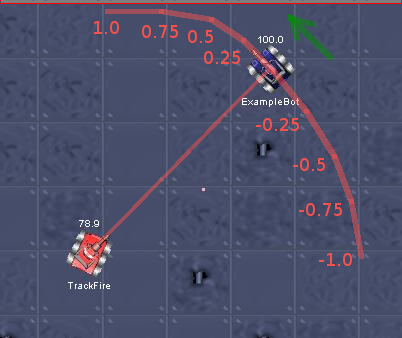GuessFactor

GuessFactor (GF) is a way of measuring a firing angle which, unlike a raw bearing offset, takes into account the enemy's relative direction at fire time and the maximum escape angle for the specific firing situation.
A GuessFactor of 1.0 represents the bearing offset that the enemy would reach if it maximized its escape angle while moving in its current direction relative to the firing bot (i.e., clockwise or counter-clockwise), -1.0 represents the bearing offset that the enemy would reach if it maximized his escape angle after reversing directions, and 0.0 represents the bearing offset that points directly at the enemy (as in head-on targeting).
GuessFactors are essentially normalized angles. They are relevant for Wave Surfing, in which all GuessFactors of each Wave are assigned a predicted danger, allowing the robot to move in the direction (True Surfing) or to the point (GoTo Surfing) of least danger. Some guns also use GuessFactors, in that they pick a GF and shoot at it. GuessFactors are not viable in Melee, as GF 0 does not exist in a field of multiple opponents. Alternatives to GuessFactors include Play It Forward and Displacement Vectors.
Calculation
int lateralDirection = ...;
double bearingOffset = normalRelativeAngle(...);
double maxEscapeAngleClockwise = ...;
double maxEscapeAngleCounterclockwise = ...;
double maxEscapeAngle = (bearingOffset < 0) ?
maxEscapeAngleCounterclockwise : maxEscapeAngleClockwise;
double guessFactor = lateralDirection * bearingOffset / maxEscapeAngle;How it works
The idea of the GuessFactor calculation is to express the enemy's bearing offset as a fraction of its maximum escape angle, while simultaneously ignoring its lateral direction. lateralDirection can be calculated directly by sign(lateralVelocity), but a more complex equation may be needed for accuracy when lateral velocity is close to 0. bearingOffset can be calculated using waves. maxEscapeAngleClockwise and maxEscapeAngleCounterclockwise can be calculated by any maximum escape angle algorithm.